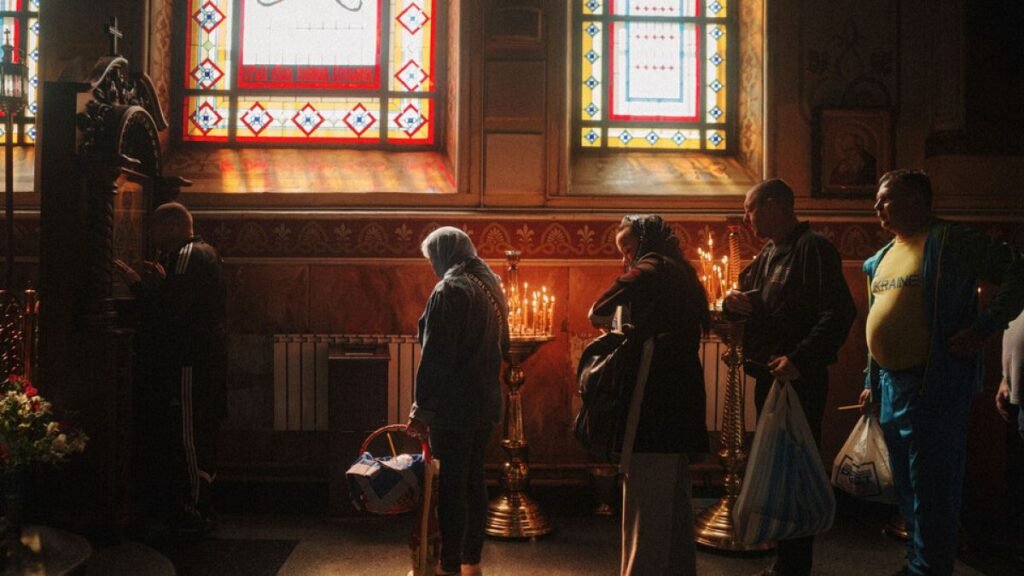More than two billion Christians worldwide observed Easter on Sunday to celebrate the resurrection of Jesus Christ after his crucifixion. The holiday is considered the most important in the Christian liturgical calendar, constituting a central tenet of the faith.
But observing the religious occasion in a peaceful and safe setting is not possible for soldiers on the frontlines in the war in Ukraine.
A temporary ceasefire was announced on Saturday by Russian President Vladimir Putin to allow for a moment of respite and enable people to celebrate the holiday, which falls on the same day for Orthodox and Catholic Christians this year, for the first time since 2017.
The peace was short-lived after the warring sides accused each other of breaking the truce and continuing to launch attacks.
Ukraine’s President Volodymyr Zelenskyy accused Russia of targeting Ukrainian cities with drones and missiles in a post an X, while accusing the Kremlin of attempting to sell the idea of honouring its temporary truce to the world.
“As of Easter morning, we can say that the Russian army is trying to create a general impression of a ceasefire, but in some places, it does not abandon individual attempts to advance and inflict losses on Ukraine.”
Despite Putin’s declaration of an Easter ceasefire, Zelenskyy said Sunday morning that Ukrainian forces had recorded 59 instances of Russian shelling and five assaults by units along the front line, as well as dozens of drone strikes.
Russia’s Defence Ministry accused Ukrainian forces of overnight attacks in the Donetsk region despite the ceasefire. It said Ukraine had sent 48 drones into Russian territory.
According to the ministry, there were “dead and wounded among the civilian population,” without giving details. It claimed Russian troops had strictly observed the truce.
Russia-installed officials in the partially occupied Ukrainian region of Kherson also said Ukrainian forces had launched attacks.
But despite the hardships of war, multiple Easter services and masses were organised across several Ukrainian cities. The capital, Kyiv, celebrated its fourth Easter holiday under martial law conditions.
Hundreds attended the services in person at the Orthodox Church of Ukraine and the Ukrainian Greek Catholic Church. The masses were also broadcast online for those unable to attend.
Hundreds of worshippers gathered on Sunday for Easter services in the Church of St. John the Theologian, a long-standing spiritual and community centre in Kharkiv.
The church has served as a source of strength throughout Ukraine’s independence and has taken on new significance during the full-scale Russian invasion, transforming into a humanitarian hub.
Father Viktor Marynchak, known since the 2004 Orange Revolution as the “priest of Kharkiv’s Maidans,” led the Easter liturgy alongside Bishop Mytrofan of Kharkiv.
The service brought together a wide cross-section of Ukrainian society, including soldiers, volunteers, and long-time parishioners.
Military chaplains were also present to bless traditional Easter bread.
Russian soldiers also celebrated Easter on the frontlines. A video released by the Russian Defence Ministry showed Orthodox servicemen participating in traditional Easter practices, such as egg colouring.
Soldiers were treated to warm meals and were given cake, as well as their own Easter service in one of the churches in the special military operation zone.
Many hope this will be the last major holiday celebrated under war conditions, as efforts to bring the war to an end, championed by US President Donald Trump continue.
Trump, in a post on his own social media platform – Truth Social, shared on Sunday that he’s hopeful that a deal to end the fighting can be reached between Kyiv and Moscow this week.
Read the full article here
